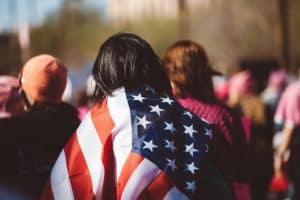Free Speech
Do you have a right to protest wherever and whenever you want? The simple answer is no. However, the right to free speech is one of the most basic and important rights in the Bill of Rights, and the government can only restrict speech in certain, well-defined situations.
As we have written about previously, Section 1983 of the 42 U.S.C. allows for individual citizens to bring suit against government officers and government entities for constitutional violations. We have written about claims for excessive force and police brutality, unlawful arrest, and illegal home searches. These types of claims all fall under the purview of the Fourth Amendment to the United States Constitution. Generally, these claims constitute the more common civil rights lawsuits filed in Minnesota courts. In this section, we briefly discuss civil rights claims available when a government officer has restricted or otherwise violated a person’s rights to free speech under the First Amendment to the United States Constitution.
The First Amendment
The text of the First Amendment is as follows:

Among other rights, the First Amendment guarantees to all United States citizens the right to speak freely and openly. As a general matter, the First Amendment establishes that, above all else, the government has no power to restrict expression because of its message, its ideas, its subject matter, or its content. Throughout history, governments have attempted to restrict speech in certain ways, whether is has been in schools, prisons, through zoning ordinances, obscenity laws, defamation laws, and even laws on lawyer advertising. Over time, courts have developed “tests” for distinguishing which governmental restrictions on the right to free speech pass constitutional muster, with the Supreme Court having the ultimate say. As the case law has developed, different restrictions on speech have been scrutinized under different standards, depending on the type of speech restricted, where that speech falls within “the scale of First Amendment values,” the type of restriction, or the reasons for the restriction. When a court says that a restriction on free speech violates the First Amendment, it usually means that the restriction fails one of these judicially created “tests.”
There are whole textbooks devoted to these “tests,” and analyses of the cases from which they derive. We by no means are attempting here to discuss the entirety of First Amendment law. Instead, we want our audience to understand that, generally speaking, the government may be liable for damages if it unlawfully restricts otherwise lawful speech. This includes instances when the police prohibit or otherwise restrict individuals engaged in lawful protest or assembly. In United States v. Grace, the Supreme Court rejected the notion that people have a constitutional right to protest whenever and however and wherever they please. But this does not mean that the police or other government officials may arbitrarily restrict the right of assembly and free speech. Rather, the government may only do so when there are other substantial interests implicated such that the right to free speech may be properly circumbscribed.
Frye v. Kansas City Missouri Police Department
In Frye v. Kansas City Missouri Police Department, individuals protesting abortion gathered at the intersection of two heavily-trafficked roads. After receiving complaints about the signs, police officers told protesters they could protest so long as they did not create a traffic hazard. However, an officer later asked the protesters to move for public safety reasons. Several protesters refused to move, and the officer arrested them for violating a city loitering ordinance. The protesters then filed a civil rights action, alleging that the police officers violated their First Amendment rights to free speech and assembly. The district court in that case granted summary judgment for the defendants. At the Eighth Circuit (the federal appeals court with jurisdiction over several U.S. district courts, including Minnesota), the court of appeals affirmed, holding that the First Amendment rights of the protesters were not violated because the protest took place in a heavily trafficked intersection during a busy part of the day, officers observed that the protest was creating a traffic hazard, motorists complained about the photos impairing their driving ability, and the officers were entitled to decide that the situation presented a danger before an accident occurred. The Eighth Circuit in Frye specifically noted that while the protesters had a First Amendment right to advocate their cause, the First Amendment did not give them a “right to dictate the manner in which they convey their message within their chosen avenue.”
The Frye case is governing precedent in the jurisdiction of Minnesota. Accordingly, it is clear that the police may restrict the manner in which an assembly is choosing to advance its voice or cause. But tension persists. This past spring, the Minnesota House passed legislation that would make it a gross misdemeanor crime to protest or assemble in such a way that it would block freeways, transit or airport roads. It is unclear what the future holds for this legislation, but you can rest assured that debates will continue on the what the proper state-individual balance is in the area of free speech in Minnesota. If you believe your rights to free speech have been violated, we are here to discuss your case with you.
Minnesota Civil Rights Attorneys
You have the right to free speech. If you believe that your First Amendments right to free speech has been violated, the lawyers at Lundgren & Johnson, PSC, are here to help. You can reach David R. Lundgren or Adam T. Johnson from Lundgren & Johnson 24 hours a day at 612-767-9643 or by entering your information on this website.

